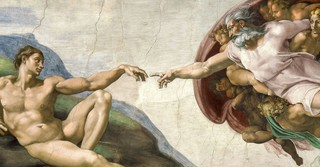10 Foundations of Faith Established in Genesis
Share

Genesis builds the foundations of the entire Bible; it is God’s opening line, how He wants humanity to understand itself in relationship to Him, and the seed of the hopeful future He has planned. While the entire Bible is beneficial, Genesis establishes many of the core foundations of the faith. It also explains the worldview that builds both the Jewish and Christian belief structures.
There are many key ideas that have their start in the book of Genesis, but some of them are crucial to understanding existence, God’s plan, and each person’s purpose in life. Our relationship with the living God is the most important one a person can have, so reading the introductory paragraph in His letter lays the foundations of our faith and relationship.
Here are 10 foundations of faith in Genesis.
1. Creation
“In the beginning God created the Heaven’s and the Earth” (Genesis 1:1).
This fundamental concept is the opener of the whole Bible. When recording His story, the Lord wanted people to understand first that He created all things. Ontology is the study of the nature of existence, including its origins.
Not only does Genesis establish that God created everything and that He Himself is outside of Creation and time, it also explains the timeline and order of Creation.
Verses that reinforce this foundation:
“By the word of the Lord the heavens were made, and by the breath of his mouth all their host” (Psalm 33:6).
“In the beginning was the Word, and the Word was with God, and the Word was God. He was in the beginning with God. All things were made through him, and without him was not anything made that was made” (John 1:1-3).
Photo credit: ©Getty Images/Vieriu Adrian

2. Humanity’s Relationship to Nature
“...And let them have dominion over the fish of the sea and over the birds of the heavens and over the livestock and over all the earth and over every creeping thing that creeps on the earth” (Genesis 1:26b).
God gave humanity dominion over the world. People cared for the animals, and Adam even named them. Humans were to cultivate the plants, to build, to shape the world. In God’s original design, all of this would be to God’s glory, perfectly balanced.
Unfortunately, due to sin, humanity has struggled with this task and has often abused this responsibility. Still, humanity has a responsibility to the planet, to cultivate it, steward it, and glorify God, but it will be difficult.
Verses that reinforce this foundation:
“Now out of the ground the Lord God had formed every beast of the field and every bird of the heavens and brought them to the man to see what he would call them. And whatever the man called every living creature, that was its name” (Genesis 2:19).
“...thorns and thistles it shall bring forth for you; and you shall eat the plants of the field. By the sweat of your face you shall eat bread, till you return to the ground, for out of it you were taken; for you are dust, and to dust you shall return” (Genesis 3:18-19).
3. The Image of God
“Then God said, “Let us make man in our image, after our likeness … So God created man in his own image, in the image of God he created him; male and female he created them” (Genesis 1:26-27).
When God created humanity, He created being that looked like Him yet were still weak. These two beings would carry different aspects of His character, would support one another, and would work together to create. Like God, humans carry different components that create one person: the body, the soul, and the spirit.
Verses that reinforce this foundation:
“Just as we have borne the image of the man of dust, we shall also bear the image of the man of heaven” (1 Corinthians 15:49).
“And have put on the new self, which is being renewed in knowledge after the image of its creator” (Colossians 3:10).
Photo credit: ©Getty Images/PeopleImages

4. Marriage
“Then the man said, ‘This at last is bone of my bones and flesh of my flesh; she shall be called Woman, because she was taken out of Man.’ Therefore a man shall leave his father and his mother and hold fast to his wife, and they shall become one flesh” (Genesis 2:23-24).
Marriage is the earliest institution God created. It was meant to be a way for humans to support one another, for the procreation of children, and the formation of healthy families. It also represents the relationship between Christ and the church.
While there are many difficulties that enter marriages because of sin, it is one of the great blessings God provides. In a healthy marriage, the Lord is glorified and the man and woman help one another grow to be more like Christ.
Verses that reinforce this foundation:
“However, let each one of you love his wife as himself, and let the wife see that she respects her husband” (Ephesians 5:33).
“Let marriage be held in honor among all, and let the marriage bed be undefiled, for God will judge the sexually immoral and adulterous” (Hebrews 13:4).
5. Separation from God
“He said, ‘Who told you that you were naked? Have you eaten of the tree of which I commanded you not to eat?’ The man said, ‘The woman whom you gave to be with me, she gave me fruit of the tree, and I ate.’ Then the Lord God said to the woman, ‘What is this that you have done?’ The woman said, ‘The serpent deceived me, and I ate’” (Genesis 3:11-13).
Sin is rebellion and disobedience against God, and it has consequences. Because of it, there is death, pain, suffering, and all other evils. Because of sin, people cannot stand before the presence of Holy God, and no one is worthy to live with Him in Heaven. Everyone sins, and nothing is how it should be as a result. Man became separated from God, and developed a need to be able to enter into a relationship with Him again.
Verses that reinforce this foundation:
“For all have sinned and fall short of the glory of God” (Romans 3:23).
“So whoever knows the right thing to do and fails to do it, for him it is sin” (James 4:17).
Photo credit: ©Getty Images/PeopleImages

6. A Salvation Plan
“I will put enmity between you and the woman, and between your offspring and her offspring; he shall bruise your head, and you shall bruise his heel” (Genesis 3:15).
God is love, and everything He does comes from a place of love. So when mankind became separated from Him, He initiated His plan to make a path for humanity to be reconciled to Him. It took time for Him to roll it out to the fullest, and He did it in His time and His way. This plan was to send His Son Jesus to die as a form of substitutionary atonement, and then conquer death by being bodily resurrected. The beginning of this plan started here, with this promise to Eve that her child would crush the serpent, though be bruised in the process.
Verses that reinforce this foundation:
“For God so loved the world, that he gave his only Son, that whoever believes in him should not perish but have eternal life” (John 3:16).
“He is the propitiation for our sins, and not for ours only but also for the sins of the whole world” (1 John 2:2).
7. Man’s Propensity to Sin
“Now the earth was corrupt in God's sight, and the earth was filled with violence. And God saw the earth, and behold, it was corrupt, for all flesh had corrupted their way on the earth” (Genesis 6:11-12).
Once sin entered into the world, everyone gave into the temptation to sin, except for Jesus during His life on earth. No matter how hard people tried to resist it or how strongly they tried to follow the Law that God gave, they could not overcome sin.
People can also commit sins that are destructive, taking life, ruining other people for fun, delighting in harm. This tendency is why humanity needed a Savior untouched by sin. It is not the mere existence of sin in the world, but that people actively choose to participate in it every day.
Verses that reinforce this foundation:
“Surely there is not a righteous man on earth who does good and never sins” (Ecclesiastes 7:20).
“For I know that nothing good dwells in me, that is, in my flesh. For I have the desire to do what is right, but not the ability to carry it out” (Romans 7:18).
Photo credit: ©Getty Images/RomoloTavani

8. God Does Not Want Human Sacrifice
“But the angel of the Lord called to him from heaven and said, ‘Abraham, Abraham!’ And he said, ‘Here I am.’ He said, ‘Do not lay your hand on the boy or do anything to him, for now I know that you fear God, seeing you have not withheld your son, your only son, from me’” (Genesis 22:11-12).
In ancient times, most religions demanded human sacrifice, and in particular the sacrifice of small children. Abram, the man from Ur with whom God would covenant, came from such a culture. God renamed him Abraham and tested him by asking the man to sacrifice his son Isaac. Not only did the test prove Abraham’s faith, it established that God would not demand similar sacrifices from others. In fact, God harshly judged cultures that engaged in human and child sacrifices.
Verses that reinforce this foundation:
“You shall not give any of your children to offer them to Molech, and so profane the name of your God: I am the Lord” (Leviticus 18:21).
“There shall not be found among you anyone who burns his son or his daughter as an offering, anyone who practices divination or tells fortunes or interprets omens, or a sorcerer” (Deuteronomy 18:10).
9. The Importance of Israel
“I will multiply your offspring as the stars of heaven and will give to your offspring all these lands. And in your offspring all the nations of the earth shall be blessed, because Abraham obeyed my voice and kept my charge, my commandments, my statutes, and my laws” (Genesis 26:4-5).
God made a covenant with Abraham, an old man who had no children, that His offspring would multiply so greatly they could not be counted. Everyone who becomes a part of the family of God, in a way, becomes a child of Abraham. However, the specific descendants of Abraham that became a nation were the people of Israel – the nation that would bring forth the Savior of the world. God made promises to that nation to provide a Messiah, whose kingdom and reign would never end.
Verses that reinforce this foundation:
“Your people shall all be righteous; they shall possess the land forever, the branch of my planting, the work of my hands, that I might be glorified” (Isaiah 60:21).
“’I will restore the fortunes of my people Israel, and they shall rebuild the ruined cities and inhabit them; they shall plant vineyards and drink their wine, and they shall make gardens and eat their fruit. I will plant them on their land, and they shall never again be uprooted out of the land that I have given them,’ says the Lord your God” (Amos 9:14-15).
Photo credit: ©Getty Images/rudall30

10. God Is Working in the World
“But Joseph said to them, ‘Do not fear, for am I in the place of God? As for you, you meant evil against me, but God meant it for good, to bring it about that many people should be kept alive, as they are today’” (Genesis 50:19-20).
God’s hand is in the world, at all times, and even today. There is much work to be done in the world while we wait for Jesus to return, but God is working through us and within us. Jesus is always knocking on the hearts of people who don’t know Him yet, and God is initiating His plans and bringing His will to fruition.
Verses that reinforce this foundation:
“For it is God who works in you, both to will and to work for his good pleasure” (Philippians 2:13).
“The Lord is not slow to fulfill his promise as some count slowness, but is patient toward you, not wishing that any should perish, but that all should reach repentance” (2 Peter 3:9).
These are just a few of the important theological and doctrinal truths established in the Book of Genesis. It is full of powerful wisdom and is worth re-visiting often to grow closer to God and learn about how He works.
Related article: Let's Go Back to the Beginning to Find the Gospel in Genesis
Sources
Greidanus, Sidney. Preaching Christ from Genesis. Grand Rapids: Eerdmans Publishing Company, 2007.
Lucado, Max. Life Lessons from Genesis. Nashville: Harper Christian Resources, 2019.
Photo credit: ©Getty Images/BrianAJackson
Bethany Verrett is a freelance writer who uses her passion for God, reading, and writing to glorify God. She and her husband have lived all over the country serving their Lord and Savior in ministry. She has a blog on graceandgrowing.com.